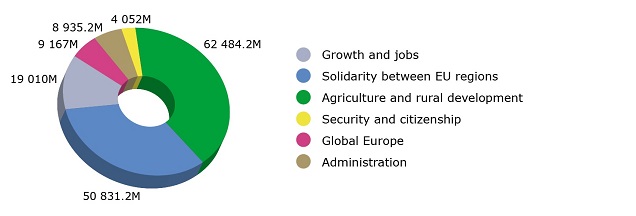Analytics, Budget, Economics, EU – Baltic States, Financial Services, Funds, Modern EU
International Internet Magazine. Baltic States news & analytics
Friday, 26.04.2024, 09:42
Using “own resources”: the EU needs a budget reform
 Print version
Print version |
|---|
The battle lasted
four years and finally ended in victory for Thatcher but damaged relations with
other EC countries. Source: http://www.bbc.com/news/uk-politics-11598879
For several
decades, the EU member states question the amounts they are paying into the
common EU budget, sparkling extensive battles every seven years in the
multi-annual financial framework, i.e. the EU budget or MFF.
Examples
It took two ugly summits at the end of 2013 to agree on the
2014-2020 budget; Britain and Germany managed to secure the first ever
reduction in overall EU payments, arguing that Brussels should apply the same
austerity to itself as it prescribed for some indebted member countries.
The new options recommended to the European Commission and
Parliament presently in January 2017 are - for raising revenue directly for
Europe and diminishing the amount handed over to Brussels by national
treasuries.
That is “simpler, more transparent, equitable and democratically
accountable” way of levying so-called “own resources” for the EU without
increasing the overall budget.
The potential new sources of income has been identified by the M.
Monty group to include the following sources: a share of taxes on corporate
income and financial transactions; an electricity tax; a carbon levy or
proceeds from the EU’s Emissions Trading System; a motor fuel levy or fossil
fuel excise duty; and other revenue from EU policies such as border control,
the digital single market, environmental protection and energy efficiency.
EU’s traditional Own Resources - EUOR
The “own resources” is money received from customs duties on goods
imported into Europe, plus a share of Value Added Tax revenue collected in the
member states.
Over the decades, the share of customs revenue in EU funding has dwindled
to about 14 percent as tariffs have
fallen. The VAT Own Resource also makes up about 14 percent of funding; together they make one-third of EU “common
income”.
On the other side, it means the rest of common finances or more
than two-thirds of the EU’s income now comes from a levy on member states’
Gross National Income (GNI), which is about 1 per cent per EU state’s GDP.
The EU limits its total Own Resources to 1.2% of EU’s gross
national income. In practice, expenditure is lower at just 1.05 percent of the
Union’s economic output in 2016, or €155
bln - barely 1/40th of national budgets.
Since the Union is not allowed to run a deficit or borrow money,
each year’s budget must be balanced, which becomes increasingly tricky since
spending on long-programmed infrastructure projects is higher toward the end of
each seven-year period.
Mario Monti’s proposal
Letting the EU gather more of its Own Resources, as the founding
fathers intended from the outset, would be a good start. That is the message of
a blue-ribbon panel, chaired by former Italian Prime Minister Mario Monti,
which will recommend new options to the European Commission and Parliament at
the end of January 2017 for raising revenue directly for Europe and diminishing
the amount handed over to Brussels by national treasuries.
The
U.K’s departure, the Monti reports says, “provides a unique window of
opportunity to review how we measure the real costs and benefits of the EU.”
Monti fears that a combination
of morally “corrupt” (his word) national politics, structural holes in the
Brussels machine, and external crises may trigger the collapse of the EU.
In his view, the Council’s
rise to prominence has been coupled with the steady drift of national political
discourses towards nationalism, populism and a focus on the short-term.
“The degree of mistrust and sheer prejudices between North and South and between
East and West has never been so high and so unashamedly voiced,” he said.
There is also a declining
trust in national authorities, a declining participation in votes, a growing
impatience with the lack of performance by national governments, he added.
Source: http://www.politico.eu/article/catching-up-with-mario-monti/









 «The Baltic Course» Is Sold and Stays in Business!
«The Baltic Course» Is Sold and Stays in Business!

